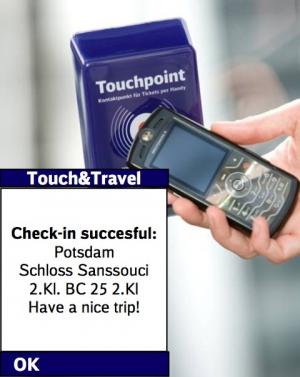Germany’s National Railway to Roll Out NFC ‘Touchpoints’

German national railway, Deutsche Bahn, plans to roll out its NFC-based ticketing service, Touch&Travel, to its long-distance stations throughout Germany this year, a spokesman confirmed to NFC Times.
The spokesman said the railway would expand the NFC “touchpoints” to 320 long-distance stations in November. With the service, preregistered users can ride trains and pay their fares at the end of the month. To travel, they touch NFC tags with their phones to check in before boarding and check out at their departure stations. The phone reads an ID number encoded on each NFC tag that identifies the station. The phone then transmits this information over the mobile network to back-end servers. The railway calculates the fares and sends a monthly invoice. It is paid mainly by direct debit from the users’ bank accounts.
“That’s the main advantage, you don’t have to care about any information, (such as) ‘what kind of ticket do I need for any of my travel?’ ” a Deutsche Bahn spokesman told NFC Times. “Just check in and just check out. All the things are billed after my trip.”
Deutsche Bahn began its Touch&Travel NFC trial in February 2008 along with mobile operator Vodafone Germany. Users could tap touchpoints to buy tickets for travel between the cities of Berlin and Hanover and also within Berlin and nearby Potsdam. The railway later expanded the trial to include other modes of mass transit in Berlin, and two other major German mobile operators joined in, Telekom Deutschland, part of the Deutsche Telekom Group, and Telefónica Germany.
With the continued scarcity of NFC phones, Deutsche Bahn in January expanded the trial to 2-D bar codes with an iPhone app. It added an app for Android phones in July. Instead of checking in and out with the bar codes, users also can type in the number of the touch points manually on their phone keypads or locate the stations on maps within the iPhone and Android apps. The bar codes, manual entry of numbers and geo-location are all slower than tapping NFC tags.
According to the spokesman, the railway has a total of 15,000 registered Touch&Travel users, with only about 3,000 of them using NFC phones.
In Germany, metro, tram and rail operators don’t have ticketing gates, so there is no need for passengers to tap their phones on readers to enter or exit stations. With Touch&Travel, they could be asked by conductors to verify their electronic “tickets," either for visual display on the phone screens or by the conductor tapping the passengers’ phones with his own NFC phone or other reading-device.
Frankfurt-based regional transit authority RMV in March said it planned to introduce common touch points this year with Deutsche Bahn for riders to tap with their NFC phones to buy tickets for both local transit and long-distance travel in the Frankfurt area. RMV has run NFC-ticketing projects since 2005. Like Deutsche Bahn, its touch points, called ConTags, are NFC chip tags encased in plastic disks and posted at transit stops.
Mobile operators Telekom Deutschland and Vodafone (Germany) are now participating in the Deutsche Bahn Touch&Travel Service, according to the spokesman.
But he said the service, which involves single trip or day tickets, doesn’t put the tickets onto SIM cards. A latter phase of the Touch&Travel trial had reportedly stored the tickets on the cards.












